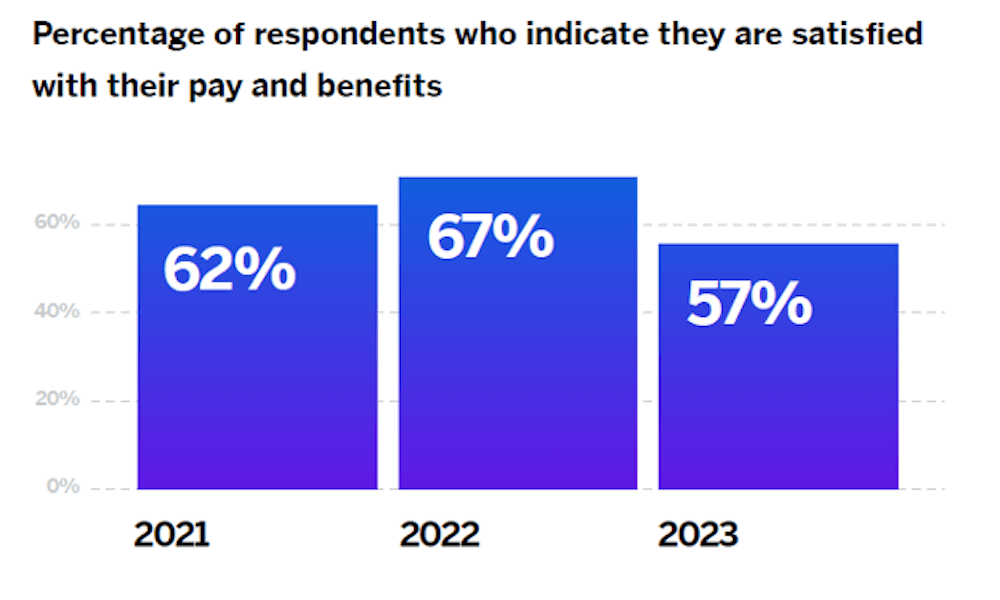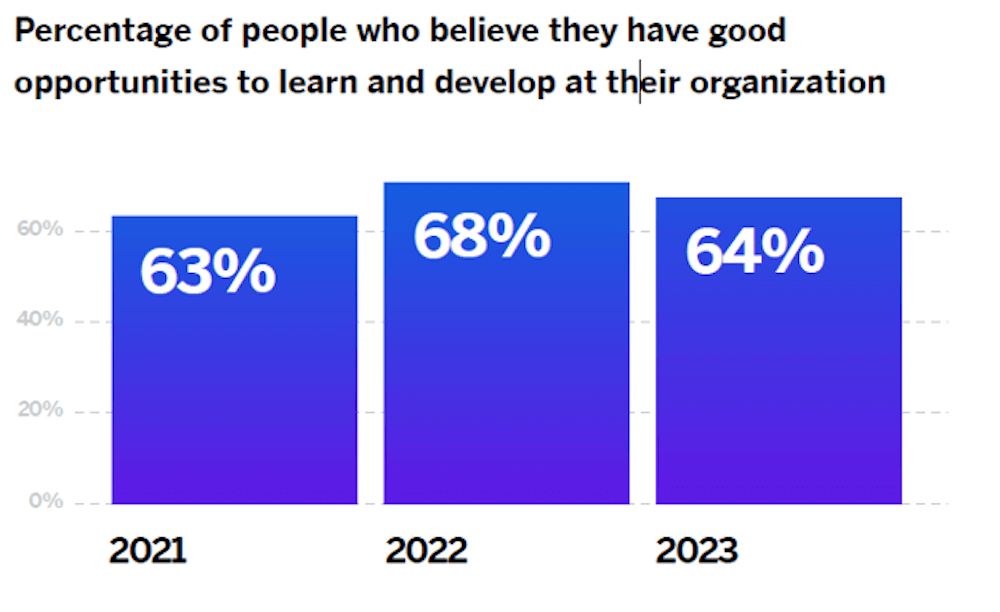What is employee job security?
According to the traditional definition, ‘If someone has job security, it means that they’re unlikely to lose their job, or their role is unlikely to become obsolete in the near future.’
While this traditional definition of job security focused solely on employees, the definition has evolved into 2023 and beyond. Increasingly, it’s not just about employee job security, but also about the security of employers as well.
As the global markets and economic climates become more volatile, job security and financial certainty have unsurprisingly shot to the top of the priority list for employees.
Many employees are starting to question the security of the organizations where they work, and whether these have the necessary integrity and structure to survive the current turbulent economic period. More than anything, people want to know that the organization they’re working for will continue to be successful in the future, and pay them a competitive salary.
Our 2023 EX Trends Report found that only just over half (57%) of survey respondents are satisfied with their current pay and benefits, and that satisfaction has dropped 10 points since last year.
Free eBook: 2023 EX trends report

Job security and a decent salary is what pays rent or mortgage, puts food on the table, covers healthcare, and supports children as they grow up. A lack of job security results in employees being destabilized. They may feel:
- Stressed
- Depressed
- Anxious
- Pressurised
- Demotivated
- Fearful of job loss
Job security versus job stability
Job security
As we’ve seen, job security means that an employee is not going to lose that job anytime soon. But job security is very much focused on the present, without giving much consideration to future career growth and skills development.
Job stability
Job stability is subtly different. It’s defined as the length of time an employee stays in their current job without any disruption. But, the definition of ‘job’ is evolving. It no longer means ‘with the same company’, it means a vocation that changes and develops, often with multiple employers, periods of freelancing or contract work, and maybe even one’s own business.
For many Baby Boomers and Generation X workers, the traditional definition of job stability with one employer was an important feature of their career, whereas Millennials and Gen Z want to develop, learn, grow and move around. The last thing they want are stable jobs for life that curtail their zest for experience and adventure. Instability is their stability.
Thus, job stability is being disrupted. These adventurous, less permanent employees feel more job stability when they are free to move around different employers, perhaps within the gig economy, and building portfolio careers.
The challenges of the pandemic changed how people viewed their work life balance, craving meaning and purpose in their work rather than spending their lives working for The Man.
Organizations really leaned on employees throughout the disruption. Now, employees are pushing back and reshaping the relationship they have with work to set healthier boundaries.
This not only offers a better work-life balance to employees, employers benefit too.
According to our 2023 EX Trends Report, of those employees who feel they have a good work-life balance, almost two-thirds (63%) are willing to go above and beyond for their organization. Win win.
Job stability also refers to how organizations offer stability to their employees through flexible working, remote working and hybrid options. This is about managing time, demands and tasks to maintain stability across different areas of life.
Why employee job security is important
The disruptors who find stability in instability still need to be secure in the jobs you give them, no matter how long they stay. When times are tough, employees place financial security and job certainty at the top of their priority list. A positive work environment combines the best of job security and job stability.
Ultimately, everyone has bills to pay, and most want to continue learning and developing, to have as fulfilling a life as possible. Job security has always been in the back of employees’ minds, but it’s really the unprecedented global events of 2020 and beyond that have reminded them of our fundamental needs, and what to expect from organizations. One of these is job security.
When times are uncertain, even the most adventurous person craves certainty. Job security matters as markets, economies, and global security become volatile. More than anything, people want to know that the organization they’re working for will continue to be successful into the foreseeable future.
It’s essential that employers instill confidence that they’re navigating a successful ship across choppy geopolitical and economic waters. This is beneficial to both employees and employers. Yet, our 2023 EX Trends Report found that despite employees giving their all to their companies during the challenges of the pandemic, satisfaction with pay and benefits dropped significantly. The overwhelming feeling is that organizations are struggling to get the basics right.
Job security and employee performance
Incredibly, some companies use job insecurity to try to make employees work harder. Jack Welch, chairman of General Electric, advocated the 20-70-10, or ‘rank and yank’ rule:
- The top performing 20% of employees promoted into jobs that fit their strengths
- The next 70% are helped by the 20% to fulfill their potential
- The bottom 10% of employees are fired for underperforming
It doesn’t take a genius to work out that 70% of General Electric’s employees lived in fear of dropping into the bottom 10% – and becoming more labor statistics layoffs.
Job insecurity can be fear of: job loss, the state of the employment market, organizational cutbacks, and hiring practices. It can also be fear of negative changes to an existing job. While a little short-lived, controlled job stress can make employees temporarily work harder, highly stressful job insecurity makes sustaining long-term performance impossible.
Highly stressed, insecure employees may:
- Work only on visible contributions
- Take risks
- Behave in unethical ways
- Be difficult to get on with in a team
- Suffer mental health well being issues
- Suffer physical health well being issues
- Bully others
- Burn out
- Simply walk
Clearly, the answer is for companies to focus on transparency, equity and fairness so that employees feel as secure as possible and perform their best: personally and professionally.
Job security and employee retention
When employers fail to get the basics right, employees walk. Pay and benefits is one of the top drivers of employees’ intent to stay, and when you think that it costs around $4000 and 24 days of lost productivity to hire a new employee, it makes economic sense to pay people more to keep them and instill a sense of security.
Job security and employee engagement
Employee engagement is the keystone of a healthy, profitable company, and job security matters to engagement. Research shows that engagement decreases by 37% among employees who feel insecure about their job stability.
But when employees feel secure, safe, valued, and that they belong, employee engagement increases and positively ripples through more employees and the company as a whole.
How companies can improve employee job security
Traditionally, employee job security (or insecurity) was the domain of the employer. But now that employees have more power and flexibility than ever, it’s up to businesses to implement solutions and create a secure workplace to support retention.
Get creative with benefits
Businesses might not be achieving the economic expansion they’d hoped for in this global climate, and may not be able to increase wages, but what other benefits can they provide?
And here, think carefully about your multigenerational workforce so that everyone gets benefits according to their needs.
A basic compensation package is fine, but what can you do to maintain a degree of stickiness that makes your best talent stay?
Here’s a few ideas:
- Well being days in addition to annual leave allowance
- Flexible/unlimited annual leave
- Flexible working
- Private health insurance
- Life insurance
- Professional subscriptions
- Wellness packages
- Free food and drink
- Enhanced maternity/paternity leave
- Sabbaticals
- Company share options
- Job shares
- Travel allowance
Create a work environment your employees will love
Whether remote or onsite, investing in a good working environment sends the message to your employees that your business intends to stick around and weather any storm. Decent technology, comfortable chairs, company swag, good lighting, pleasant color schemes, living plants, even an office dog. Make your workplaces somewhere people will want to be in.
Invest in training and development
In today’s disruptive world, it’s essential for employees to train, learn and upskill, especially as most skills are transferable. Employees want career mobility and clear timelines for their own progression.
Encouraging mobility is a win-win as the employee develops skills for life, and the employer gets a skilled team member, who may well stick around longer before being tempted away to new opportunities – where they’re a great future contact.

Honest communication and transparency
Most people can deal with adversity as long as they know what it is, what it means, and that ‘we’re all in it together’. Employees can handle the truth – so tell them.
Think about how financially inclusive your pay and benefits are. Many people associate inclusive practices with employee diversity and talent processes, but they can also apply to employee benefits.
Having a conversation about pay is not taboo. The external landscape has changed, so talking about and understanding how to meet employee expectations in the area of job security is critical to providing a great employee experience.
Ask your employees
The best way to gauge how your employees are feeling about their job security and their plans for future career development is to ask them. You can use engagement surveys, pulse surveys and one on ones with a manager to uncover experience gaps. Then take suitable action on the data to ensure you have the happiest, most secure and stable workforce possible.
Free eBook: 2023 EX trends report